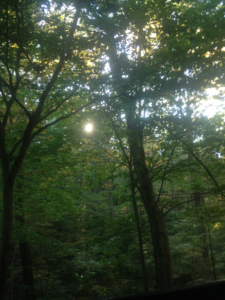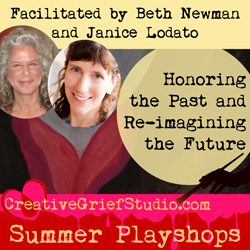This article also appears in the Huffington Post.
 The ground shifted underneath me. November 2016 was a month of grief and shock for me. The loss of the election by way of the Electoral College to a man who brings darkness and hatred with his words and actions shook me to the core. Then, on the Tuesday before Thanksgiving, one of my colleagues took his own life in our office suite. I’m still reeling from it all.
The ground shifted underneath me. November 2016 was a month of grief and shock for me. The loss of the election by way of the Electoral College to a man who brings darkness and hatred with his words and actions shook me to the core. Then, on the Tuesday before Thanksgiving, one of my colleagues took his own life in our office suite. I’m still reeling from it all.
On the one hand I’m doing ok. Still doing all my self-care: Reiki and meditation every day, eating nutritious foods, and exercising. I’m also focusing on talking with others about these losses. Sleep has been a mixed bag and, honestly, the darkness of this time of year creates an extra weight.
I’ve always been interested in the mind-body connection. When I was a philosophy student, “The Body in the Mind” by Mark Johnson was very influential to me. During this grieving-time I’m paying attention to the signs in my body.
“I’m doing ok,” I tell everyone and yet my head is pounding. I catch my reflection in a window, and I see my body slumped forward. It is difficult to sit up straight. I eat well and then suddenly intense nausea grips me. I sleep very little or a lot or I wake with a fright during the night.
Work is very difficult. Each day I dread going back to the office. I was not there when Sergey’s body was discovered so I don’t carry that pain, but I feel the grief of my colleagues. I see their swollen faces, their gaze that is focused on the floor, and I hear them saying, “I’m ok.”
I’m pushing on at work. Trying to be strong for myself and others. This is the job that I wanted, that I have been seeking. I have a wonderful set of colleagues, the work is meaningful, and a great institution supports us.
However, as things return to normal: an 8-hour day with 10 meetings; demands to meet unrealistic schedules; and difficult problems to solve technically and interpersonally; I feel myself recoiling from it all.
This grief is significant. These dark days are difficult. It’s all a familiar feeling – not sure if that helps or not that I’ve felt this before. I keep coming back to this metaphor:
The “lifeboat” has taken me out to sea. It dropped me off with my surfboard in my regular clothes, no fancy wetsuit or bathing suit. Only thing is, I don’t know how to surf.
Maybe I knew once – in a previous life? Who knows? Anyway, I recall seeing what others do at these times.
They lie down on the surfboard and start paddling with their arms.
So I start to do that. I see a wave form and know that I’m supposed to stand up on the board, balance, and ride the wave. I attempt to do this, but I’m smacked down by the wave and it pushes me to shore.
I stand up with my surfboard in one hand, soaked, sand inside my clothes, salt water in my nose and mouth.
Stinking eyes see people waving to me from the lifeboat – they’re telling me to ride the waves again.
And so I swim out to where the waves are breaking. I don’t know how to do this surfing thing, of that I’m sure, but I see a wave coming and try to stand on the surfboard. I do stand for a tenuous moment with fingertips still clinging to the board and then I fall again.
Back on shore, I sit in the sand exhausted and sore – knowing I’ll need to ride the waves again and again until I’m an expert at this thing I never wanted to know how to do.
That’s what grief is like for me right now.
I don’t know how this will all work out. I do know this is a very difficult time for myself and others and so my intention is: self-care and care for others.
As we navigate grief, I want to offer to you a helpful thought – a practice. When we’re grieving I know these things are helpful:
- Reiki
- Meditation
- Time in nature
- Talking with friends
- Physical movement
- Creativity
That last one is particularly powerful. One doesn’t have to be a skilled artist or even produce work that you share with others, it is the act of creating that breaks down the bonds of grief. Some helpful resources can be found here.
So, I invite you to a place of self-care and creativity. Care of yourself through mindful practices of Reiki, meditation, journaling, connecting with like-minded people, being in nature, moving your body, and creating.
These things will build you up and support your heart in its journey. They will also point to the actions that will align with your values and intentions.
Wishing for us all healing of body, mind, and spirit.


 Just when you think you’ve “moved on” and accepted your new normal, you notice someone who reminds you of your beloved. Or you reach into your closet and pull an old sweater to your face and your mind floods with images of the one you’ve lost. Or you sit on the edge of your bed to get dressed and remember how you sat there that day – stunned by feelings of loss and grief. How can it be? You’re right back where you were before.
Just when you think you’ve “moved on” and accepted your new normal, you notice someone who reminds you of your beloved. Or you reach into your closet and pull an old sweater to your face and your mind floods with images of the one you’ve lost. Or you sit on the edge of your bed to get dressed and remember how you sat there that day – stunned by feelings of loss and grief. How can it be? You’re right back where you were before.